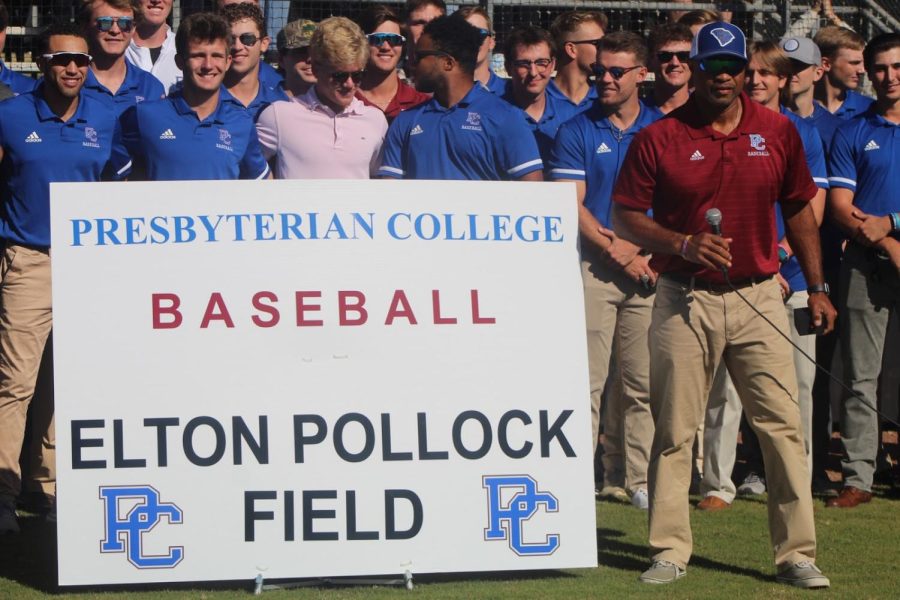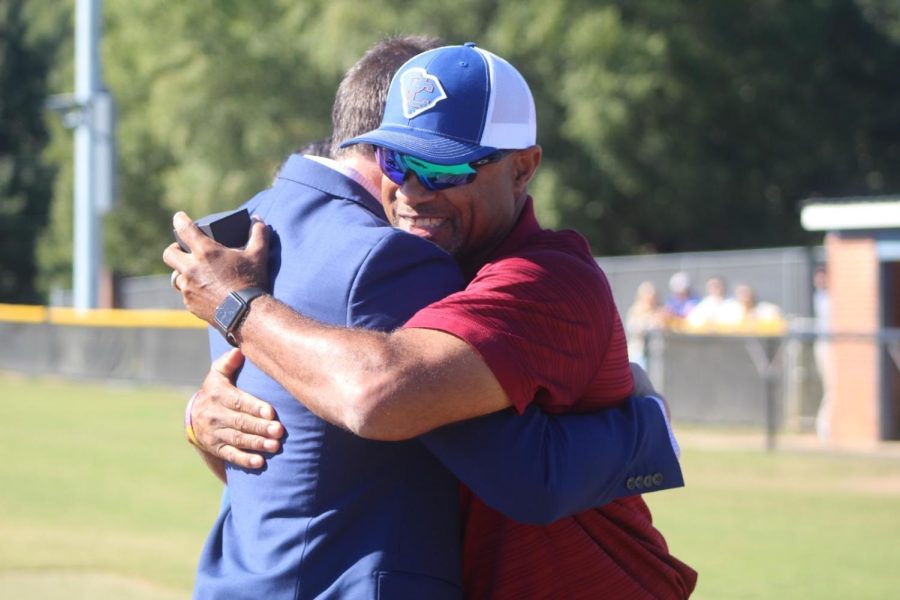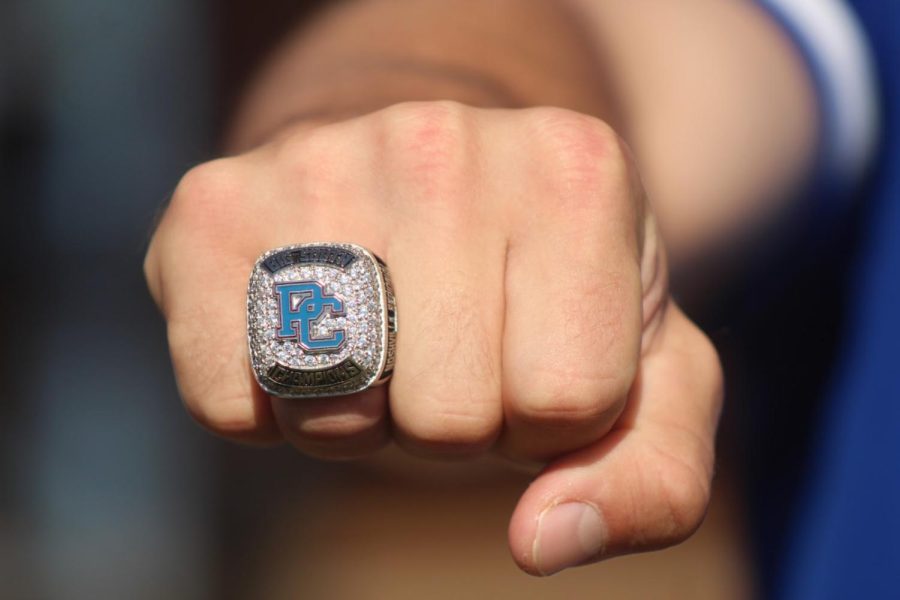At Long Last: Elton Pollock Receives Honor of a Lifetime
November 15, 2021
Led by Coach Elton Pollock, the Presbyterian College baseball team is entering the upcoming season as defending Big South Conference champions, and next season the team will play in the same stadium but with a different name: “Elton Pollock Field”.
After getting Presbyterian College’s baseball team to the NCAA Tournament for the first time in school history and helping them earn championship rings for their hard work, Coach Pollock himself got recognized for the work he has done.
In addition to lights being added, PC’s baseball stadium will now be called “Elton Pollock Field.”
The news was surprising to the 18th year coach as family members, former baseball players, and alumni gathered to congratulate him on the honor.
“I was totally blown away. I was really excited. I still don’t know how to really accept it to be totally honest. I’m just humbled to say the least when someone would think enough of me to do that and just the effect that I’ve had on student-athletes in particular, many of the ones who made it possible in a positive way,” Pollock said. “That’s something cool to know that you can affect people in that way and not really take it for granted.”
But getting there wasn’t easy for him. Through his days as a baseball player to getting the last out in the Big South Tournament, coach Pollock believed that with the hard work and perseverance put in, the better the results will be.
The Love of the Game
Coach Pollock got into the game of baseball after watching several of his family members playing the game. After giving it a shot, he knew it was something he wanted to try out.
“I fell in love with it after watching my dad and all my uncles play community baseball back when I was a kid. It was a game that I really gravitated to and one that I really enjoyed playing,” Pollock said.
Pollock’s love for baseball grew even more after watching his cousin make the Atlanta Braves roster. Reflecting on that time in his life, Pollock remembers how his family used to go to the old Atlanta-Fulton County Stadium and watch several Brave’s greats, such as Dale Murphy play in the facility.
“I grew up watching the [Atlanta] Braves. I was a huge fan of Dale Murphy in those days when they played at Atlanta-Fulton County Stadium. I actually had a cousin that made it up with the Braves, so we would go down to Atlanta and see him play, which is how I got to see Dale Murphy and others play back in the day,” Pollock said.
Not only did Pollock earn a baseball scholarship, but he also earned a football scholarship when he came to Presbyterian College with the help of former football coach Harold Nichols and former baseball coach Tim Corbin.
With the help of the respective coaching staffs, Pollack was able to fulfill a dream and played both sports during his time in Clinton. It has been considered a common trend to play for multiple teams, since athletes like Deion Sanders and Bo Jackson split time between the NFL and MLB during the early 90s.
After his PC playing days, Pollock was drafted in the Major League Baseball Draft, alongside a fellow teammate. From there, he would play for the Pittsburgh Pirates organization which was led by three time Manager of the Year and World Series champion Jim Leyland, as well as other successful baseball figures at the time.
“It led to a situation where I had a teammate drafted in the sixth round of the 1995 Major League [Baseball] player draft and I was drafted in the 15th round that year. I got drafted by the Pittsburgh Pirates and I was mentored by guys such as Willie Stargell, Bobby Meacham, Lloyd McClendon, Cam Bonifay who was the general manager of our organization, and Jim Leyland,” Pollock said. “Really, a lot of big time baseball names that were involved with and ones that I got to play for.”
Following his MLB career, the current PC baseball coach would join the business world until he decided to get into the coaching ranks at his alma mater – a decision that changed his life.
The Transition
In 2002, Pollock would join the Blue Hose baseball team as an assistant coach under Doug Kovash. Shortly after, he would be promoted to head baseball coach and have the opportunity of a lifetime to lead the school he once played for.
But the job was going to get a lot tougher.
Even though PC had won baseball championships in 1998 and 2003 as a division two school, the College, along with their other athletic programs, was making the transition to division one. Because of NCAA rules, the Blue Hose were not eligible to compete for championships during a five year period.
Despite the adversity, Pollock relied on and developed strong relationships with various school administration officials and athletic directors to overcome the challenges his program would face.
“It all comes down to the communication and relationships with the guys that you work for. I think I have had a great relationship with every athletic director that I’ve worked with. As for PC, I think they understand the tough climate that is in place for us to win,” Pollock said. “If you go back to previous coaches’ track records, we were division two and then we started a five-year process when we were transitioning to division one.
“During that transition, we were not eligible to compete for championships and that made recruiting extremely difficult and a lot of people were playing that. Not just in our sport, but across the board. Those were some of the things as you come out of that transition period from division one and after that, that’s when the building process starts for the most part,” Pollock continued.
It would take Pollock twelve years to finally earn his first winning season in Clinton back in 2017 with a 32-29 record. The Blue Hose would make the Big South Conference Tournament Final, but got upended by the Radford Highlanders.
Despite the loss, Pollock was extremely grateful for the support he received from school officials for the program, especially at a time when coaches from various sports teams were getting fired for not meeting certain expectations year round.
“It was a testament of perseverance from a school that stuck with me and also one that communicated with me because of the circumstances we were in to transition a program from division two to division on,” Pollock said.
Pollock described the transition as an underdog realtily.
“It’s an underdog mentality. We are the smallest division one school and really just going out there with a slight chip on our shoulders to prove that we can shock the world. Coaching through those difficult years and going through the ups and downs has given me a leg up in terms of coaching a team that is struggling to identify with kids that are personally struggling,” Pollock said.
The good news is that all of his hard work was about to pay off in a massive way.
Getting over the Hump
The 2021 Presbyterian College baseball team appeared at first to be out of sync with a 2-8 record near the end of March, while various games were being postponed or cancelled due to the COVID-19 pandemic.
However, the Blue Hose flipped the script and got rolling into the Big South Conference Tournament, where they had to beat the number one seed Campbell twice and Gardner Webb once to make the NCAA tournament.
The team did exactly that, clinching the championship with a 8-5 win over the Campbell Camels and reaching the NCAA tournament for the first time in school history.
“It was bigger than anything I have ever experienced in the game of baseball and I knew the story of perseverance of what the team had been through to get to that point. Past, present, and what it means for the future, it meant everything to them that they’ve been through since the fall,” Pollock said.
“To do it at a division one level with the things that we had to deal with last year, having a lot of guys out during certain periods of time which included some of our key players, I think it was exhilarating for the guys that came before that struggled through the transition,” Pollock continued. “It was such a validation for the hard work that has come in through the program by every coach and assistant that recruited every kid to be here.”
Along with t-shirts, celebrations, and a future ring ceremony, PC was placed in the Nashville Regional, ironically against former coach Tim Corbin’s Vanderbilt Commodores squad, a program considered to be one of the best in collegiate baseball, and an Indiana State Sycamores team known for consistent success.
Ultimately, the Blue Hose would not advance after falling 0-10 and 2-9 respectively to the Commodores and Sycamores. Vanderbilt would eventually reach the College World Series in which they would lose to the Mississippi State Bulldogs two games to one in an all SEC clash.
While the ending was a disappointment, Coach Pollock felt that the whole PC community needed something of an excitement, especially with the national exposure the revenue championships had brought.
“I think Blue Hose nation needed that. Our college was in need of positivity and we were able through the game of baseball to bring light into that regard and I thought it was good for the school as a whole in any capacity,” Pollock said.
A Reflection
College coaching is an extremely difficult job. From recruiting to game-planning, it offers an incredible sacrifice for people to take the time away from their loved ones.
The journey wasn’t easy, but coach Pollock felt extremely blessed for his family after taking a look back at all the accomplishments he achieved at PC.
“I’m thankful for what it means for my family that has sacrificed so much for me to be away and be on the road for so long. My mom and dad, who are still living and being able to attend that event. And for all my friends that came up, the alumni, the former players, and everyone that reached out that weren’t able to be in attendance. I would say that I’m extremely grateful,” Pollock said.
In terms of other coaches across the country looking to get over the hump, Pollock had a simple message of advice for them.
“Just love your players. Communicate, be able to listen, and try to find common ground so that you can have that player’s trust in your ability to move them forward in their career. It’s not just about the X’s and O’s,” Pollock said.







